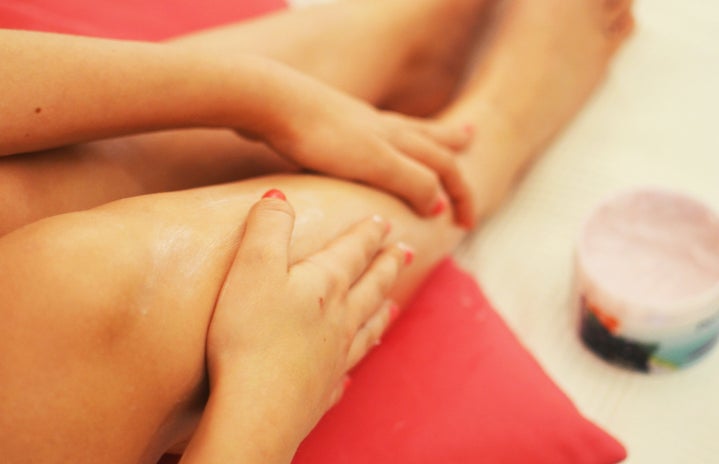For all of human history and within most human civilizations, women have been taught to be ashamed about various aspects of ourselves or the way that we exist. From the shapes of our bodies to the choices we make, shame has been a formative part of women’s lives, and none of it is based on any factual evidence. One of these sources of shame has its roots deep in the capitalist upbringings of America and has become the subject of my own personal social experiment: the removal of female body hair. Or, rather, the lack thereof.
The sleek, silky-smooth image of women was popularized in America in the 1910s by the women’s fashion industry, women’s magazine industry, and men’s hair removal industry. When companies realized the potential revenue in marketing towards women, as well as marketing “new and improved” versions of women, they expanded their demographic to include them in order to turn a profit. Advertisements began depicting the “ideal woman” as one who expressed all of the pre-existing patriarchal attributes, plus this new one: hairlessness.
Naturally, I have a problem with this. Now, this isn’t to say that women should feel bad about shaving their legs just because it has a problematic history; I know for a fact that getting into bed with shaved legs and clean sheets is an almost euphoric experience, I’m just here to advocate for the choice. I’ve heard so many women and girls complaining about shaving their legs in every way possible, from being embarrassed when they skip a day, to just simply not feeling like doing it, and a common thread in everyone that I’ve heard complain about it is the fact that they feel like they don’t have a choice. Many women are taught to feel that shaving their legs is their only option, and so I adopted my own personal social experiment as a way to defy gender expectations, and also to answer two questions: 1) do other people actually care if I have hair on my legs? And 2) do I actually care, on an individual level?
My process for testing this has been simple: don’t shave my legs at all for the months of November, December, January, and February. When I first started this experiment it was the winter of 2018-2019, and I was living in Oregon, so my initial motivation was simply the fact that it was so cold outside for so long that I was only going to be wearing pants for the duration of the four months and no one was going to see my legs anyway. As I went along not shaving my legs, it gradually evolved into something that I was proud of doing and determined to go through with. Not to mention the convenience of taking much shorter showers. I finally shaved sometime in March and had a brand new perspective on hair removal that I hadn’t expected, and decided that this was something I wanted to do every year. So last October I shaved my legs for the last time and set about my winter as a hairy, confident, still-feminine woman once again.
Before I start talking about the benefits I received from my experiment, I feel that it’s necessary for me to point out a particular point of privilege that applies to me in ways that it does not for a lot of women. My leg hair is blonde, which means that it’s essentially invisible to others unless it’s in direct lighting or I explicitly point it out. I’m aware that there are many women who grow much thicker, darker hair than I do, so the social pressure to shave is much more strictly enforced and much more negatively reactive. I want to make it clear that this experiment is not just to measure how others will react to seeing my unshaven legs, but rather how it makes me feel as an individual, independent person to go out into the world knowing that I’m breaking one of modern society’s unwritten rules for people of my gender. It was less to capture the reaction of the people around me than it was to learn to be more comfortable in my own skin, independent of what the rest of the world may be thinking or saying about it.
As I went through November and December without shaving my legs, I found the experience different than my first year because, since I had moved to southern New Mexico, winter had a whole different meaning than it did in the Pacific Northwest and I found it 80 degrees in early November, which meant that I was wearing shorts, skirts, and dresses much later in the year than I ever had before. Still, I found that it really wasn’t that difficult to skip shaving my legs, despite the fact that the world could see them. As time moved on, I even found myself wanting people to notice, just so that I could have the chance to explain my thought process behind the whole experiment and prove to others that it didn’t matter. What I learned was that I never had to prove that it didn’t matter in the first place. I found myself talking about my experience with my friends, and their reactions were all supportive, if not completely neutral. I grew comfortable giving them updates on how long it had been since I shaved, and showing them my hair-growth progress, and every time I did I was met with either positive or disappointingly neutral reactions.
I eventually became comfortable enough that whenever the topic of shaving would come up in any context, not just people I’m close with, I wouldn’t feel ashamed of mentioning the fact that I hadn’t shaved my legs in four months. I started wearing skirts and shorts to work, and I would walk in wondering if anyone would notice, but I went about my shifts and never once received a single comment about it. Even on bright, sunny days when my leg hair was obvious, not a single person pointed it out or gave me judgemental stares (that I noticed, anyway), for the entire four months that I put down my razor. In fact, my self-confidence only improved throughout my experiment, and I found myself enjoying the experience of having leg hair. It was soft and warm, and comforting, in a way, and I enjoyed the fact that I knew that I had the freedom to get rid of it at any time, but that my daily life was in no way affected by my choice to keep it.
So at the end of the four months, late at night on February 29th, I was kind of sad to be shaving my legs again. While I could’ve just decided not to shave and keep up the experiment indefinitely, I wanted there to be a conclusion to my experiment so that I could have the opportunity to reflect on it as a whole, complete process. Ever since this experiment has ended, I’ve pretty much completely forgotten about my leg hair. First off, I’m way out of the routine of shaving them, but I also have taught myself that it’s not something I should have to stress about, and it’s actually amazing how much simpler my daily life has gotten since I stopped thinking about it altogether. Now, the only reason I shave my legs is that I decide that I actually want to, and I’m no longer bound by the feeling that I need to. Once again, no one should feel ashamed of shaving their legs after reading this, or like their routine of shaving is inherently bad or “anti-feminist.” This experiment, for me, is just my annual reminder that I don’t need to be hairless to be feminine, respected, or confident, and if anyone else out there has found themselves feeling upset or trapped inside the hair-removal paradigm I would encourage you to consider this: you do have a choice, and no one can stop you from taking the steps to grow into your own confidence.
Also, it straight up just feels really good to defy the world’s expectations.



